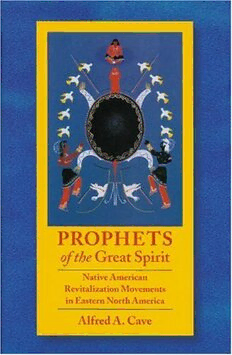
Prophets of the Great Spirit: Native American Revitalization Movements in Eastern North America PDF
345 Pages·2006·1.576 MB·English
Most books are stored in the elastic cloud where traffic is expensive. For this reason, we have a limit on daily download.
Preview Prophets of the Great Spirit: Native American Revitalization Movements in Eastern North America
Description:
Author Alfred Cave presents a lengthy treatise arguing the premise that an American Indian concept of a 'Great Spirit' evolved among divergent groups post contact with European missionaries. I enjoyed reading this history even though it presumes (speaking for my grandfathers,) that before we were ever known, that we had no traditions of our own upon which to deduce the white man's religious traditions contain similarities which we could name for ourselves in our own languages. After all, the barrier of languages existed well before these spiritual leaders endeavored to stir a pan-Indian yearning in our souls.
Consequently, this work stands as a sociological analysis because it is based on anecdotes of those who encountered the authentic characters. Although there exist contradictory reports of the origins of the Shawnee Prophet La-lay-weth'ka (Tensquatawa), and his brother Tecumseh the great war chief, this volume favors that version of legend which has their family being one of many siblings abandoned by their mother after the death of their father. When she gives birth to triplets, Tecumseh, Tensquatawa, and a third brother who dies, a toddler, she returns to live with her father's people, leaving the Shawnee prophet and his brother to be raised by older siblings.
It seemed remarkable to me that two chapters, a full 80 pages of the book are focused on the story of these two brothers, and the events that shaped them. Most of it is devoted to historical recounting, so it stands out amidst an otherwise sociological attempt at explaining the psychology of the peoples in conflict. The following historical citation profiles how murder was racially condoned when it involved killing an Indian (even one invited to a treaty negotiation):
"British general Thomas Gage complained that 'all the people of the Frontiers from Pennsylvania to Virginia inclusive, openly avow, that they will never find a Man guilty of Murther[sic], for killing an Indian' Gage described the frontiersmen as a 'People...near as wild as the country they go in' and 'by far more vicious and wicked' than the Indians they sought to dispossess." "In the same vein, Gov. John Penn of Pennsylvania had complained a year earlier that 'no jury in any of our frontier counties will ever condemn a man for killing an Indian. They do not consider it in the light of murder, but as a meritorious act'."
Although I don't necessarily accept the premise of this author and other ethnographers, being that nativistic religious expression is overly syncretic, (ie. borrowing from external religious sources without comprehension) it becomes quite clear in these pages how the Eastern American Indian prophets by processes, accomplished an attitude among their followers which demonized the old world spiritism of their ancestors. In contrast, those whose efforts were perhaps more successful, owing that they brought less destruction upon their own people, would include Kenekuk the Kickapoo prophet, and Handsome Lake the Seneca prophet. Readers can learn more of what these chiefs strove to achieve, in their own words, from the following sources,
Spiritual Leaders (American Indian Lives)
Kenekuk, the Kickapoo Prophet
The Code of Handsome Lake, the Seneca Prophet (Forgotten Books)
I also concur with the previous reviewer that the bibliographical references in Prophets of the Great Spirit are indeed substantial. Readers should prepare themselves to patiently digest countless descriptions of the social attitudes and outbursts of missionaries, Indians and colonists. Complaints and characterizations without dialog get kind of heavy at times. I had to put it down several times and restart with a refreshed mind.
See more
The list of books you might like
Most books are stored in the elastic cloud where traffic is expensive. For this reason, we have a limit on daily download.
